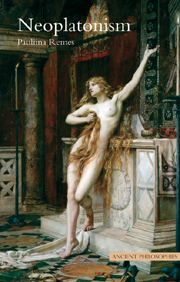Book contents
- Frontmatter
- Contents
- Preface
- Acknowledgements
- 1 Introduction
- 2 The first principles and the metaphysical hierarchy
- 3 Nature and the sensible universe
- 4 Human being and the self
- 5 Epistemology and philosophical psychology
- 6 Ethics and politics
- 7 The Neoplatonic legacy
- Glossary of terms
- Guide to further reading
- References
- Index of passages
- Index
7 - The Neoplatonic legacy
- Frontmatter
- Contents
- Preface
- Acknowledgements
- 1 Introduction
- 2 The first principles and the metaphysical hierarchy
- 3 Nature and the sensible universe
- 4 Human being and the self
- 5 Epistemology and philosophical psychology
- 6 Ethics and politics
- 7 The Neoplatonic legacy
- Glossary of terms
- Guide to further reading
- References
- Index of passages
- Index
Summary
In the course of Western history, it turned out that the Neoplatonic understanding of Platonic philosophy became the reading of Plato, to finally gradually crumble away only as a result of the rise of modern philological and historical scholarship emerging in the seventeenth century (Tigerstedt 1974). Thus when we speak of Augustine's Platon-ism or of the so called Cambridge Platonists (of the seventeenth century), we are often speaking of Platonism that is saturated by many Neoplatonic insights into Plato. This makes it difficult to disentangle Platonic and Neoplatonic influences. The study of the Neoplatonic heritage can be roughly divided into two. On the one hand, there are direct influences, which are sometimes explicitly reported by the thinkers themselves. This means that the author in question has actually consulted the Neoplatonic works. On the other hand, there are indirect influences that may come, through intermediaries, from a variety of sources. These are more usual but sometimes also more difficult to prove. The core of scholarly work must then be in the study of the similarity of doctrines rather than the curriculum or intellectual history of the author studied. In the case of Neoplatonism the latter kinds of influences are much more common.
There are several reasons for the prevalence of Neoplatonic interpretation of Platonism. The early Christian Fathers and thinkers were often deeply influenced by Neoplatonism, even though they departed from ancient thinking in holding, among other things, that time and universe have a beginning in the creation.
- Type
- Chapter
- Information
- Neoplatonism , pp. 197 - 208Publisher: Acumen PublishingPrint publication year: 2008

